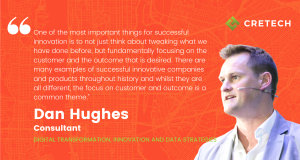CREtech Consulting Report: How to Future Proof Your Real Estate Business
CREtech Blog

CREtech is proud to introduce our new monthly content series focused on our Global Innovation Consulting Practice. Each month we will take a deep dive on an important trend in the world of real estate technology and innovation. These themes, which are carefully selected by our world-class team of Consultants and Advisors, will then be released to our community through a series of insightful webinars, blogs and market research.
In the first CREtech Consulting report, we will take a look at which technologies have emerged from the pandemic as the “must haves” for landlords and brokerages. As a result of the pandemic, real estate companies have been forced to adopt technology with a greater sense of urgency than at any time in history. Our team of world-class Consulting professionals and Advisors will share their unique perspectives on adoption trends and strategies during these challenging times.
CREtech Consulting Report: How to Future Proof Your Real Estate Business
Pre-pandemic, the real estate tech world experienced record growth in terms of both funding and the number of startups forming. Adoption within the real estate industry, however, was anemic. “PropTech was barely understood or appreciated and in some cases even resisted,” according to Colliers. Then, the pandemic completely upended the real estate tech sector, sidelining the “nice to haves” and pushing “must haves” to the forefront. Today, the definition of essential has changed.
In order to operate at all during the pandemic, “technology became the only way to continue day-to-day business,” notes Colliers. Never before have so many real estate companies (landlords, developers, brokerages, asset managers, construction companies, etc.) been forced to so quickly adopt technology. From an operating and communications perspective, most were not prepared for the forced work-from-home environment, nor the new requirements to market, lease, and operate property.
To float in the new normal, proptech adoption has been compressed from years to months—or even weeks. Proactivity now is table stakes to avoid giving away the keys to the fortress. If you retrench back to the old, tech will disintermediate your tenant relationships. Getting unseated from the customer experience is the single greatest threat that tech poses to those who do not adopt it.
In the midst of being beaten down by the need for survival to see another day, what can you do to sharpen your innovation muscles?
Understand what’s around the bend. Know what’s coming down the pike. CREtech has polled its experts to better understand which real estate technologies have risen to the forefront and are being adopted more aggressively than others.
Put Access Control Front and Center
No matter where you fall in the realm of CRE, controlling who accesses your buildings is paramount. Lockdowns are a new reality likely to remain in varying degrees for the next 12-24 months, and with contact tracing part of the strategy to combat Covid-19, property owners must ensure their assets are equipped to play a role in the increasingly regulated economy.

Digitally controlling access to your buildings is safer than the alternative. It’s more secure, too. And, it’s simply a better experience all the way around. Badges distributed by the doorman or security guard have been the standard for decades. No longer. Brand new Class A & B buildings are equipped with digital access control. But many buildings are still stuck in the stone age.
According to Lee Odess from Group337, "When it comes to your access control system, it is time to look at it through a digital lens versus a safety-only lens. Although extremely important, the days of access control systems only having a single value proposition, ‘keeping bad people out,’ are over. They now have the opportunity to deliver additional value in conveniences and health. It is going to take prioritizing and a renewed curiosity around what systems like these can do. Trust your instincts here and know that you do not need to sacrifice security for convenience and health. What you need is a new partner to show you how.”
Give tenants, and their guests, the holy grail: safety, security, convenience, and cleanliness—all in one. What’s not to like?
Move to Virtual Property Touring (& Leasing)
When physical leasing came to a standstill with the onset of the Covid-19 pandemic, virtual leasing became essential—in an instant. As adoption of self-guided, remote, virtual, and video touring happened, prospective tenants and residents quickly accepted the new opportunities as a way to continue looking for office space or homes while dealing with environmental conditions. The added flexibility of scheduling online and digital viewing options opened up a new realm of possibilities to connect with customers.
Yet there was no fully digitized end-to-end solution allowing a prospect to go from lead to tour to lease, according to Khushbu Sikaria. In her piece “Connect the Digital Dots: Solving Multifamily’s Four Biggest Challenges, Sikaria notes that efficiency is lacking: “Dozens of point solutions exist to solve a piece of the puzzle, but operators are often forced to patch together five or more technologies to create a fully automated funnel.”

According to Pat Klein, SVP & Chief Technology Officer at Essex Property Trust, “Rather dramatically the real estate industry embraced the use of virtual touring options after resisting for so long due to the perception that face-to-face direct personal contact was required to close a deal. That has proven to be an unfounded objection and I do not see the industry returning to the days of only personal, escorted tours.”
Sikaria elaborates on the idea: “Creating a holistic solution would require connecting the digital dots between email, chat, text, and voice communication that would then transition to scheduling a tour, conducting ID verifications, facilitating self-showings, answering follow-up questions, and then closing the sale by presenting the customer with an online application, all in a consumer grade package that feels human-like.”

The key here is that it’s not about entirely removing humans from the equation, but rather streamlining inefficient aspects of the complex process while providing customers with an immediate and cohesive experience.
Diversity of Talent
More of the same isn’t going to change the game. Fresh perspectives drive out-of-the-box ideas. At the end of the day, humans—not tech—plan the future. Tech alone will not save a business or single-handedly transform the industry.
According to Linda Isaacson, Managing Director and Global Head of Innovation and Technology at Ferguson Partners Ltd., “When we think of innovation strategies for real estate companies to adopt, we often neglect to think about the talent strategy. Talent is arguably the most complex component in the innovation equation. Diversity of talent drives a diversity of thinking, which has a direct correlation to innovation and financial performance.”
“While digital technology is increasingly essential to growth, the critical driver of innovation is people, not technology. Real estate companies must focus on acquiring and utilizing a combination of talent and technology to accelerate the implementation of strategies that will drive analytics and innovation, optimize operations, and achieve sustainable competitive advantage.”
And just because diversification is the “right” thing to do morally, isn’t the only reason to seek more diverse talent. The data supports it as well. McKinsey research shows that “Businesses with more culturally diverse executive teams are 33% more likely to see above-average profits.”
The biggest blunder you can make is to neglect the core of your business: human capital.

IOT & Automation
A hot topic for years, the Internet of Things has taken on a whole new importance as safety and automation take center stage. Recently, the biggest change is an urgency to integrate the latest cleaning advances—those that change how we track cleanliness, such as biosensors that measure air quality—now rather than a decade from now. Not many people would think to even ask about air quality when signing a lease a mere six months ago. Now, with “one way to reduce the spread of coronavirus [being] to maintain ventilation with plenty of fresh air” according to the Wall Street Journal, it’s an essential part of the decision-making process. Building owners have no choice but to act with, for instance, a renewed push for autonomous HVAC systems that optimize themselves to increase air quality using less energy.
“New technology, data connected devices, and sensors will enable buildings to become more interactive and responsive—something that will be essential with the installation of technology such as temperature monitors as part of the ongoing battle against COVID-19,” according to Colliers. With varying levels of building use permitted by local regulation, software will be required to regulate how many people can use a space on any given day/week. The operating system for the office will be ushered into reality.
Darren Wesemann, EVP and Chief Innovation Officer for Berkadia, believes changes should focus on the “automation of anything high-touch, human workflows, and physical interactions.”
Sikaria mentions that “the industry needs more full-service options, rather than point solutions. It is only then that operators will fully adopt and advance to a high-tech automated, 24/7 process that will allow them to reduce operational expenses.”
Casey Talon, research director at Guidehouse Insights, opines on SmartCitiesDive:
“When these elements are well designed and implemented, they help optimize airflow, monitor and direct space use, and report system performance against metrics that determine compliance with social distancing and public health goals.”
In addition to all that, Wesemann also believes owners and operators should integrate “remote work enablement for operations … so we don’t get caught with our pants down during a ‘second wave,’ or the next catastrophe.” For instance, automating industrial inspections by leveraging robots is something we should expect to see in practice in the years ahead.
Buildings will finally become smart decades ahead of an environment driven by a normal adoption curve. And, according to a recent Harvard report, “Healthy [b]uildings represent, without exaggeration, one of the greatest health—and business—opportunities ever."
Sustainability Can’t be Avoided
Once Covid-19 passes, the industry—and the world—will immediately be presented with another crisis to deal with: climate change.
A wide range of cities, such as New York, San Francisco, and Toronto, have joined the Carbon Neutral Cities Alliance, a collaboration of cities agreeing to cut greenhouse gas emissions by 80-100% by 2050 or sooner. That will play out in local building policies that owners and developers will have to abide by, as we’ve seen with the Seattle City Council “consider[ing] a ban on natural gas for newly constructed homes and buildings, favoring the use of electricity for heating and cooking,” according to the Seattle Times. It’s an example of far-sweeping energy policies enacted by cities—Berkeley, California being the first city to ban natural-gas lines last July. Meanwhile, New York City has mandated “that existing buildings—from municipal offices to private businesses, hospitals, and apartments—must drastically curb their carbon emissions,” as reported by Bloomberg.
The Built World has beacons of hope—perhaps none more so than the Empire State Building, an icon of the New York skyline that has spent the last decade undergoing a massive sustainable transformation, according to the Washington Post. Retrofitting has led to “elevators [that] generate energy as they move,” ultra-insulated windows, and efficient LEDs that together “have slashed carbon emissions from operations at the Empire State Building about 40 percent.” The trust that owns the building believes there is “an additional 40 percent in the decade to come.” Those changes have led to “sav[ings of] more than $4 million a year on its electric bill,” paying for the renovation twice over already.
Get out ahead of sustainability now before mandates dictate it. It’s either retrofit now or later. There is no avoiding it. And for ground up developments, you would be wise to avoid installation of a mechanical system that will be sunsetted long before its shelf life expires decades down the line.
Customers as a Guiding Compass
You won’t emerge a winner as a real estate tech company if you’re not focused on your customer’s needs, desires, and expectations. Every new real estate tech adoption will come down to technology that better enhances and prioritizes the customer journey—that streamlines, transforms, and reduces friction in this new normal the pandemic ushered in.
Even pre Covid-19, social isolation was a serious problem. During this pandemic, which may not abate for two years, its role takes on a historic importance. A wide range of software platforms help facilitate community within buildings, but with most spaces operating at 25% to 50% capacity for the foreseeable future, communications will reign king to “ensure that your customers receive, read, and stay compliant with [local mandates],” according to Sikaria. The bottom line: Communication with residents, and among them, is paramount to thriving in the years to come no matter what the world may throw at you.
Tenant experience apps have been talked about for years. But, as discussed before, “incumbents have historically not been keen to use technology to service tenants because they never had to.” There is no longer any adoption decision: It’s a must.
According to Dan Hughes, founder at Alpha Property Insight and specializing in Digital Transformation, Innovation and Data Strategies, "One of the most important things for successful innovation is to not just think about tweaking what we have done before, but fundamentally focusing on the customer and the outcome that is desired. There are many examples of successful innovative companies and products throughout history and whilst they are all different, the focus on customer and outcome is a common theme."

Amazon comes to mind as a company that has conquered its (many) sectors with a customer obsession. Apple, too. And Starbucks. Each company’s customer-first mandate has pushed it to category king status—a position strong enough to weather even the toughest economy.
”Never before in my career in real estate tech have I seen such interest, demand, and actual deployment of technology as what we are witnessing today,” stated Michael Beckerman, CEO, CREtech and FUTURE PropTech. “One of the most glaring revelations during the pandemic was how unprepared most businesses were given the widespread work-from-home mandate. And the real estate industry was certainly one of the most unprepared—a reflection of its historic lack of tech adoption. What was a ‘nice to have’ overnight became a ‘must have’. Now we are finally seeing, albeit for reasons that I wish weren't happening, innovation adopted as a way not only for companies to operate more efficiently in this disruptive work environment, but as a smart and essential strategy for them to future-proof their business. These investments made in people, processes, and products will not just reshape their businesses, but our entire industry along the way. For the better!”
Particularly given an uncertain business environment, future-proofing your real estate business requires a fundamental altering of how you spend, locate, and operate space for the foreseeable future. There’s no takebacks either—tech adopted now will become the expected norm in a post-pandemic society. Unconventional thinking is more valuable now than ever. Strong and decisive actions are necessary. Bold strategies are the only path forward.
Now isn’t the time to simply watch things unfold. Take the lead. Your future prosperity as a real estate asset owner and manager depends on it.
WATCH NOW - CREtech Consulting Talks Webinar: How to Future Proof Your Real Estate Business
[embed]https://www.youtube.com/watch?v=yVeJclGa7dA[/embed]
We have curated the most experienced team of real estate tech consultants in the world to help you future proof your business.
We understand your company's unique tech objectives, analyze current practices, and recommend new solutions that will accelerate your tech adoption and overall operational efficiency. We also offer onboarding solutions to ensure a smooth transition, train your employees and make the process as simple as possible for you.
contact us at consulting@cretech.com to learn more or visit www.cretech.com/consulting
